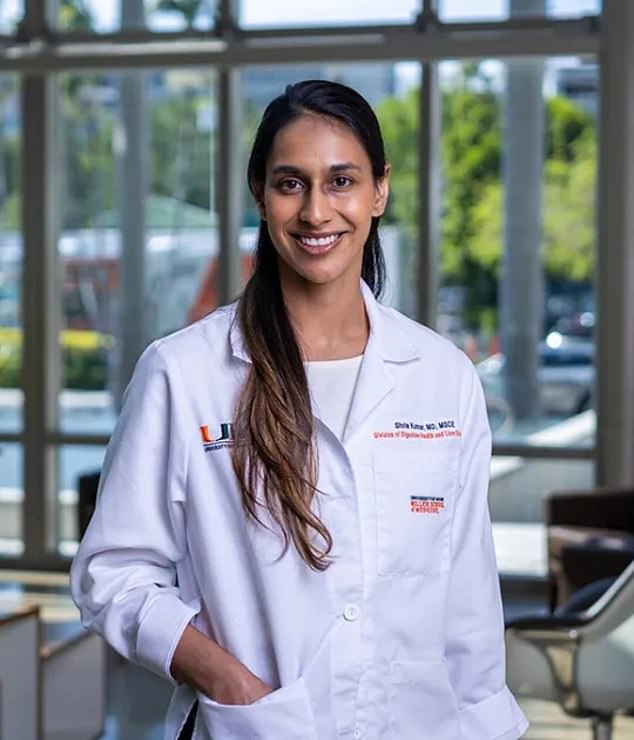Colon cancers may be increasing in those under 50 due to an increase in “accelerated aging,” a new study suggests.
These people have a biological age greater than their chronological age, due to a mixture of lifestyle choices such as diet and alcohol consumption and environmental factors such as exposure to chemicals.
Researchers studied people under the age of 50 who had colonoscopies and calculated their biological age by analyzing blood samples.
They found that each year of accelerated aging correlated with a 16 percent increased risk of developing polyps, small growths that can lead to cancer.
The team was surprised to find that other risk factors normally associated with colon cancer, such as body fat and smoking history, were not linked to the disease.
A growing body of research suggests that accelerated aging is becoming more common, even as life expectancy continues to increase – a paradox that researchers are still investigating.
Dr Shria Kumar, a colorectal cancer specialist behind the new research, said: “Aging is multifaceted and we need larger studies to determine whether the biological age of most people is the same as their chronological age. »
That said, she added: “It is quite striking that several studies, including ours, have shown that biological age provides distinct information about health and could help us prevent cancer.”
This discovery occurs in a global context explosion of colon cancers in younger patients this confused doctors.
Although it is more common in those over 50, the disease has increased by 50 percent among younger age groups over the past three decades, recent data suggests.
That’s why health leaders in the United States now recommend that colon cancer screening begin at age 45.
Some doctors now say it should be even younger, because half of early-onset colorectal cancers occur in people under 45, according to the latest statistics from the National Cancer Institute.
In the United Kingdom, NHS Screening is only available for people aged 54 to 74.
There are now multiple ways to screen for colon cancer, including more convenient testing of stool samples collected at home.
But colonoscopy, a procedure that requires sedation in the hospital, remains the gold standard.
During a colonoscopy, the doctor identifies and removes polyps – of which 30% of people suffer – and prevents the formation of cancers.
“What I think is really exciting about the opportunities presented by colorectal cancer is that we have a clear prevention tactic,” Dr. Kumar said.
“Colonoscopy is not only early detection, but also prevention of cancer.”
His team now wants to determine which people are likely to suffer from accelerated aging and start prioritizing them for colonoscopies.
Tests to determine people’s biological age range from $100 to $1,000 (£700), although there are concerns about their accuracy.

If a person is 50, but their biological age is 55, their aging has accelerated by five years, said Dr. Shria Kumar, a colorectal cancer specialist who led the new research.
The exact reason for the link between accelerated aging and colon cancer is not fully understood.
However, some factors that increase the risk of early onset of colorectal cancer also increase biological age.
These include poor diet – especially a diet high in ultra-processed foods – obesity, smoking, alcohol consumption and other lifestyle habits.
Other key factors in accelerated aging are pollution and stress.
Earlier this year, separate search found that young people with certain types of cancer – particularly lung, gastrointestinal and uterine cancers – were more likely to suffer from accelerated aging.
Intriguingly, US researchers involved in the study said there was “strong evidence” that the risk of accelerated aging, and therefore developing cancer, increased with each successive generation born after 1965.
And that could mean that Generation Z – those born between 1997 and 2012 who are now becoming young adults – are at much higher risk of developing life-threatening illnesses such as cancer at a much earlier stage than their parents or grandparents.
Professor Ilaria Bellantuono, co-director of the Healthy Lifespan Institute at the University of Sheffield, told MailOnline: ‘We don’t know enough to say definitively that younger generations are aging faster or why,’ she said.
“This research has not been done. But it’s not impossible. We’re seeing more illnesses in young people, the kinds of illnesses we might normally expect to develop in older people.
“And biological aging is a risk factor for these diseases. In the same way that smokers increase their risk of lung cancer, does accelerated aging increase the risk of developing more chronic diseases in the long term?
Consultant oncologist Dr Hendrik-Tobias Arkenau, of HCA Healthcare in London, said the colon Cancers in young people are most often only detected at a later, or sometimes tragically final, stage.
“Who thinks that a 35- or 42-year-old person has bowel cancer if they have stomach aches, weight loss, blood (in the stool),” he said.
Dr Arkenau believes the reason for this increase is unclear, although he believes it is a combination of factors influencing the gut microbiome of young people.
He said the use of antibiotics during childhood, declining breastfeeding rates, vitamin intake and changes in diet are just a few factors that could come into play.
“There is no clear thing, I think it is multifactorial and there are other aspects,” he said.
Analysis suggests that deaths from bowel cancer in the UK are expected to increase by 2,500 a year by 2040.
Meanwhile, the number of people diagnosed with the disease in the UK will increase by around a tenth over the same period.
Bowel cancer currently kills just under 17,000 Britons each year, and only half of those diagnosed are expected to survive 10 years after learning they have the disease.


